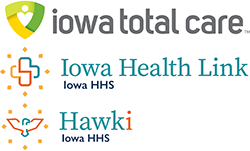When to Use the ER
Iowa Total Care understands that you may have health conditions that need immediate attention. Many times the condition may require a visit to an emergency room (ER). How do you determine if or when you or a loved one should go to the ER?
If you think that you or a family member is having a medical emergency, go to the ER to see a doctor right away. You may need to call 9-1-1 if the person’s condition needs immediate attention where you are. For non-emergencies, please contact your primary care provider (PCP) or visit a local clinic or urgent care facility. You may also call our 24/7 Nurse Line for assistance at 1-833-404-1061.
Where To Go For Care
Free 24/7 Nurse Advice Line
Medical professionals can answer your health questions and help set up doctor appointments. Call for:
- Help caring for a sick child
- Help knowing if you should see your Primary Care Provider
- Answers to questions about your health
Primary Care Provider (PCP)
Your PCP is your main provider. Call the office to schedule a visit if you don't need immediate care. Make an appointment for:
- Vaccinations
- An annual wellness exam
- Help with colds, flus and fevers
- General advice about your overall heatlh
- Care for ongoing health issues like asthma or diabetes
In-Network Urgent Care Center
Go to a nearby urgent care center if your illness or injury isn't life-threatening and your PCP's office is closed. Make an appointment for:
- Flu symptoms with vomiting
- Ear infections
- High fevers
- Sprains
Emergency Room (ER)
Consider all your options before going to the ER. Visit the ER if you're experiencing a LIFE-THREATENING injury or illness. Go here for:
- Broken bones
- Bleeding that won't stop
- Labor pains or other bleeding (if pregnant)
- Shock symptoms (sweat, thirst, dizziness, pale skin)
- Drug overdose
- Ingested poison
- Bad burns
- Convulsions or seizures
- Trouble breathing
- The sudden inabilty to see, move or speak
- Chest pains or heart attack symptoms
- Gun or knife wounds
Iowa Total Care supports each member and family member in their decision for medical care. Always get immediate medical attention if you think you or a loved one is having a medical emergency. You may need to call 9-1-1 if the person’s condition needs immediate attention where you are.

